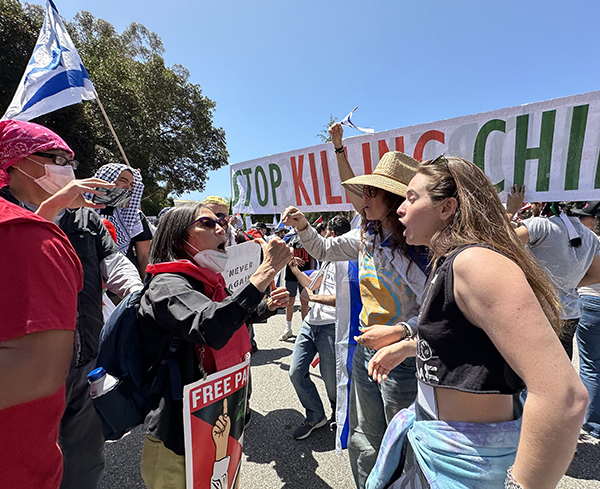By Earl Ofari Hutchinson
Contributing Columnist
The instant the protests at UCLA, USC and other local campuses began, the protesters were hit with one charge. They and their protests were antisemitic.
No matter how many times protest organizers swore that their protests and encampments were not aimed at Jews or the destruction of Israel, it mattered little. Many conservatives and established Jewish organization, the Republican Party, and many in the media still lambasted the protests as fueling antisemitism. They were right and wrong.
The major protest group leaders scrupulously have avoided the least hint of any antisemitic utterances. They repeatedly made clear their goal was a Gaza ceasefire and for the U.S. and colleges to stand down in their lopsided support of the Israel military establishment’s relentless Gaza incursion.
Unfortunately, apart from the protesters’ valiant and politically correct efforts to maintain the political and moral high ground on Gaza, antisemitism has surged in the U.S. Beyond the anecdotal reports of threats, harassment and actual attacks and even beyond the numbers compiled by the ADL and FBI that showed the surge in antisemitism in the country, Gaza was the spark that ignited the surge.
That was far different than the endemic antisemitism which has been a well-documented disgraceful part of America’s past and present.
“The latest outbreak of this plague of hatred is different from earlier outbreaks,” said American University history professor Pamela Nadell. “Alas, what is unique is the extent of the antisemitic vitriol magnified horrifically on social media.”
This was the lethal tag team of hate that was a byproduct of Gaza and inflamed social media.
Nazi and white nationalist hate groups were the masters of the malicious use of social media sites to pump their antisemitic messages with minimal to no prohibitions. They were also masters in ways to skirt the checks that were there. Their messages were effective.
The proof was in the steady stream of postings always anonymously that called for “Gas the Jews” or an online threat to “shoot all you pig Jews.” The hideous irony was that there was no evidence in any of these hate sites that the avowed Jewish haters showed any sympathy or concern about the plight of the Palestinians, much less knew anything of consequence about the history of the Israeli-Palestinian conflict. The Palestinians were just another convenient ploy to verbally, and in some cases worse, attack Jews.
Typical of this ignorance and indifference toward Palestinians but using them as an excuse to assail Jews was this classic example. The Los Angeles Police Department launched a hate crime investigation against one man who shouted, “free Palestine,” “kill Jews,” and “Israel kills people.”
After a week of war, FBI officials essentially confirmed that much of the verbal and even physical threats and violence were made by unreconstructed antisemites playing off the Palestinians to spread their hate. “The volume and frequency of threats to Americans, especially those in the Jewish, Arab American and Muslim communities in the United States, have increased, raising our concern that violent extremists and lone offenders motivated by or reacting to ongoing events could target these communities,” the FBI said last October.
There were two lethal signs that the deadly events in Gaza would make a bad situation worse. The first was that the Israeli-Hamas war would almost certainly continue to flare for a prolonged period.
“These kinds of spikes in hate crimes are unlike 20 years ago because they are elongating,” said Brian Levin, the founder of the Center for the Study of Hate and Extremism. “We aren’t only seeing a higher number occur, but that increase is resilient and plateaus for longer. Or, after a period when hate crimes have gone down, we sometimes see them reignite like wildfire.”
As long as the war raged, it would remain at or near the top of the news with all the usual human tragic scenes of war and violence that stir people’s passions and emotions.
“When these kinds of world events take place, whether here or abroad, people feel strongly about them, “ said Frank Pezzella, a professor of criminal justice at John Jay College. “And when people have strong beliefs, they act out. They look at people in their neighborhoods and blame them for what is happening in the Middle East, or they blame all Asian people for what started in Wuhan, China.”
The second sign was the continued refusal of many police departments to keep accurate statistics on hate crimes and attacks in their cities. That assures that an incident or attack that may have been motivated by racial, gender or religious hate would not be categorized as a hate crime.
That further guaranteed that the number of hate crimes would be severely undercounted.
The number of antisemitic hate crimes that were counted and documented as such left little doubt that Gaza was the latest trigger. A cursory comparison of the numbers tells the grim truth. According to the ADL, in the week after the war’s start, there were more than three hundred incidents.
The Gaza campus protests sadly are yet another reminder of how antisemitism remains a never-ending reality for Jews and, by extension, America.
Earl Ofari Hutchinson is an author and political analyst. He is the host of the weekly Earl Ofari Hutchinson Show from 9 to 10 a.m. Saturday on KPFK 90.7 FM Los Angeles and the Pacifica Network.












